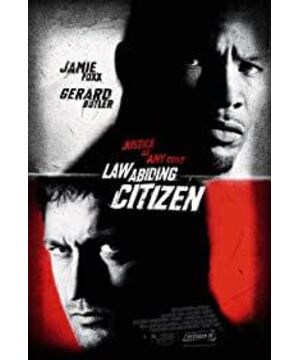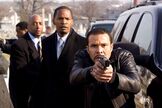OK. I must admit that I am out of date. "Law Abiding Citizen" has been out for so long, and now I watched it under the recommendation of a friend. Good...
for this film, I should say that my evaluation is moderate—excellent, but the director’s intentions have been confused by his own plot, and the ending part has to follow Hollywood’s usual pattern—mainstream Victory-came to cater, and as a result, he slapped himself in the mouth. Oh, if the protagonist does not die and the town hall explodes, how complete the expression should be.
To understand this movie, one must have a certain understanding of the American judicial system. Otherwise, one will stand one-sidedly on the naive position of "good guys" and "bad guys" and classify the poor prosecutor as a "bad guy." Wouldn't it be wronged?
The beginning of the movie is a tragic story.
The protagonist’s family was robbed by two mobs, his wife and daughter were raped and killed by A gangster (Damn, it’s really fucking not a human being, such a small girl would not let it go, really should be a thousand swords), the protagonist was fortunate not to die, Two gangsters were also captured. The black prosecutor went out. This person is an elite of prosecutors with a very high conviction rate (that is, the proportion of criminals prosecuted by him who are convicted by the jury), because he believes that some of the evidence in this case is difficult to fully stand up (especially the key to semen) There is a problem with the evidence), and the protagonist may be cross-examined by the defendant’s lawyers with "insanity" (that is, hallucinations under the impact of a specific intense event), which may result in insufficient evidence to cause two people For reasons such as the acquittal of the culprit, he made a "deal" with culprit A, and culprit A "confessed" and "tested" culprit B. In this way, both culprits could be convicted, and the prosecutor could continue to do Add a few percentage points to your "conviction rate". As a result of this transaction, the bandit A was given a lighter punishment for "confession and testimony", bandit B who did not "kill" and "rape" was sentenced to capital punishment (it seems to be Pennsylvania or where, anyway, there is a death penalty) of).
The biggest conflict emerged-Bandit A had a heinous crime (raping and killing two people, one of whom was a young girl) was released after being imprisoned for a few years; while bandit B, who was relatively kind, was executed. The protagonist believes that both people have to die, especially A. The biggest problem leading to the above unacceptable result is that the prosecutor did not fully prosecute the two with the support of existing evidence and strive for complete "justice." , And made a deal with A.
Therefore, the protagonist, this man with super killing technology and cooperating with the U.S. Department of Defense, began his own pursuit of "fairness". Through a series of "technology" applications, almost all the prosecutors, lawyers, judges, and judges related to this case Two criminals were killed by him, especially the frenzied criminal A, who had his eyelids cut, chicken cuts, and legs cut, and they were divided into twenty-five pieces. In the end, the protagonist intends to detonate the city hall in the meeting, kill the senior officials of the city, and cause a super big case, which will arouse everyone's concern about the unreasonableness of the "deal" between the prosecutor and the prisoner, and reflect on this American judiciary's usual practice. s method.
To understand these plots, we must understand two things. It is "evidence" and "transaction".
In the United States, the most important basis for the convictions and judgments of various types of criminals is the "presumption of innocence", that is, all persons prosecuted by the prosecutors shall be treated as innocent until they are not confirmed and convicted of guilt. The presumption of innocence emphasizes that the crime charged against the defendant must have sufficient, conclusive and effective evidence. If the guilt cannot be proven in the trial, he should be presumed innocent. This foundation emphasizes the super importance of "evidence"-all evidence must be "no problem In the case of an order, it is clear that the indicted person can be 100% confirmed as evidence of the guilt. This has led to such a defense strategy-to prove that the evidence is suspicious-even if you witness it with your own eyes, as long as I can prove your insanity, your testimony will not be accepted. For example, although the protagonist has seen the misery of his wife and daughter with his own eyes, he is only a witness. Moreover, the status of witnesses is completely passive. It's not that you can go up if you want to go up and make a statement. It's not that everything you say will be recognized by the jury. As long as the defense lawyer proves that he was mentally stimulated and mentally disordered, his testimony will be difficult to be judged by the jury. adoption. This unquestionable and clear requirement for evidence has led to such a result-some criminals escaped legal sanctions because of the lack of evidence or the questionable nature of the evidence, which is unfair to the victims. .
So, is this system wrong? of course not.
This whole set of systems in the United States is based on the freedom and happiness of each individual "person". If there is insufficient evidence to be convicted, then which member of this society can safely and boldly pursue his own happiness? Maybe someone framed him one day. More importantly, the absolute requirements of judges and juries on evidence can prevent the government from persecuting civilians to the greatest extent. Because the prosecutor is a government official (the inspection agency is the administrative agency of the U.S. government, and the court is the judiciary, these contents involve the separation of powers, which is more troublesome, so I won’t go into details), if government officials hate any troublesome civilian If you want to send him to prison or even end his life, isn’t it too simple? From collecting evidence and presenting evidence, there are all people in the government. If the key trial links are not treated fairly (there must be evidence to prove guilt without error), then where is social justice at all? Therefore, this system fundamentally guarantees the possibility of fair treatment of the entire society. But, of course, for victims who cannot see the conviction of criminals, the justice of the system and the justice of the group are followed by some individual justice. Sacrifice-but, from a certain perspective, this sacrifice is necessary-without these individual justice sacrifices, there is no possibility of group justice; and without the justice of the system and group justice, any individual justice cannot To guarantee. Which one is lighter and heavier can be seen at a glance.
Regarding the transaction between the prosecutor and the criminal. In the United States, the procedure for judging a case is generally to first announce the accused charges to the defendant. The defendant can then decide whether he feels "convicted". If the defendant denies, the trial will continue in accordance with legal procedures. During the interrogation process, various evidences will be presented in court, and various witnesses will be called to testify. The lawyer will ask witnesses different questions in court. Then the jury will vote to decide whether or not it is guilty. If it is found guilty, the judge will announce the sentence and so on. The judge has no power to determine whether the defendant is guilty or not. This power is always in the hands of the jury. However, after the conviction is "convicted", there is a limited adjustable range for the length of the sentence for the same crime, that is, there is a gap between the maximum and minimum sentences that can be imposed on the same crime. Judges have certain powers to measure sentences within the limits prescribed by law. As an administrative agency, the prosecution can ask the judge for a lighter sentence (if the judge thinks it is possible. Most of the time the judge will agree to the prosecution’s proposal) in exchange for the defendant’s "confession" and "correction." Why has to be this way? There are two main reasons. One is that the trial of a case requires a lot of manpower and material resources. Therefore, the prosecution generally encourages the defendant to "confess guilt" or "testify", and generally will commute the sentence in exchange for "confession" and "testify". Therefore, in general cases where the evidence cannot be denied, the defendant will generally choose to "plead guilty" or "testify" in exchange for a reduction of sentence. In this case, this is an option that is beneficial to both parties. In fact, most criminal cases in the United States are closed with the defendant pleading guilty because the prosecutor has conclusive evidence. Another reason is that, as a prosecutor, the prosecution of this particular defendant was declared successful at the moment the criminal "confessed." It is the judge's business as to how much to sentence. There is no direct relationship with the prosecutor, so the black prosecutor in the film believes that as long as the two people are convicted, he will be successful. The increase in the "conviction rate" is his performance. As for whether the victim is fair, this The prosecutor needs to ask his own conscience.
So, is this system right, suitable or inappropriate? This again involves the understanding of administrative agencies. Administrative agencies, as institutions that manage national social affairs, have a very important proposition, that is, "pursuing efficiency". Whether it is disaster relief or adjudication, it should use the least administrative cost to obtain the greatest administrative efficiency. This is obvious-during Hurricane Katrina in the United States, the Bushi government was blamed for its low disaster relief efficiency; and during the Wenchuan earthquake in China, China's efficient disaster relief measures were praised by the world. Of course, it is better to judge cases more efficiently. You must know that spending a lot of time, financial, manpower, and material resources on a case will affect the trial of other cases. It will also be unfair to other victims and unfair to the entire society (for the system, we can only rely on a group of people). Think about gains and losses from a perspective, not an individual perspective). Therefore, in the judicial system, "confession, testimony" in exchange for a lighter criminal punishment is a universal principle, which is worthy of affirmation.
After understanding the two things of "evidence" and "transaction" mentioned above, we understand what the director of this film wants to say-what he actually wants to express is that under the current judicial system, the justice of the system and the justice of the group are maintained. 、Is it correct that administrative efficiency has sacrificed a small part of "individual justice"? This is a reflection.
So, does the movie have a conclusion? I don't think so.
The protagonist, this victim, he killed many people. His position should be that "individual justice" is the foundation of all justice, and we cannot sacrifice individual justice for the sake of system justice and group justice.
Prosecutors, mayors, etc., what is their position? Of course, it is necessary to maintain the current system, and they feel that they are of course correct.
Originally, both lines were well expressed. If in the end the protagonist successfully bombed the city hall and all high-ranking officials were killed, this incident would become a major case of a century, then I think it’s good and it can prompt people to think. The purpose of reflection is achieved. As for who is right and who is wrong, and where to go, don’t care at all. Because the answer is obvious, and a perfect system will not emerge after reflection.
However, there was chaos in the film-the mayor, as the representative of the system and the group, said during the meeting, "No matter what method is used, this person must disappear tomorrow (to the effect)". This sentence is completely Denying the rationality of the system-since no matter what method is used, why didn't you do it during the trial of this case? Don't impose capital punishment on two garbage that are obviously criminals? Is it possible that for social security, the administrative agency can kill a citizen without evidence (when the protagonist was killed, the protagonist was still locked in a dungeon, and there is no evidence to prove that he killed)? Isn't this tyranny? ——The director and the screenwriter are not slap their own mouths. What is it?
The result of the film is that the black prosecutor found the protagonist’s tunnel and the bomb placed in the city hall, then put it in the protagonist’s dungeon, and then advised the protagonist not to set off the bomb. Blew himself to death. pity.
The film finally achieved only one result-the black prosecutor reflected on it, and then decided to go all out in the future, not to engage in transactions or to pursue the conviction rate (this seems to be an individual decision that negated the system)-a big proposition Next, a small result was achieved.
Therefore, my conclusion is that the film is still a success from the story point of view, but it is a bit messy in terms of expressive intentions-to support the individual, the protagonist should not die; to support the system, the mayor should not say that. , The final statement of the black prosecutor is unnecessary.
It can be scored 7 points...Finally, mother, Chinese screenwriters and directors are basically pigs except for a few. Who can make a film with a good story and powerful? Stories can’t be told well, so what kind of art are you talking about, idiot! That is to put the scene around, get nervous...
View more about Law Abiding Citizen reviews










